@Political Interest , thank you! You said;
It's always the comfortable ones who send our men in to get shot at and die in these wars for these fake pseudo rights.
Technology and the ''civilianization'' of political government have exacerbated that trend, whereas in earlier times political leaders either led the troops into battle, or had experience previously that proved their leadership ability.
In this world do we actually have any control over our fate? I am starting to think what we can and cannot control is actually very limited. This world is like a flowing river and we can only swim in certain directions of the current, but in the end the river still takes us where it is going, whether we want to go along with it or not.
I try to draw a balance between the perception of my free actions and the knowledge of the benign sovereignty of an Almighty but all-good and loving God.
On Islamophobia;
Most Islamophobia is born out of imperialism or as a means to justify imperialism in the Middle East. It serves neither the colonising power or the colonised but the egos and bank accounts of a few lunatics.
Most anyway in this modern age, it's true. But i'll have to admit that not being Moslem and adhering to what I consider the proper Monotheistic faith, I can't help but have some concerns.
Or again it's the liberal racism of civilising the barbarians, teaching them how to live like the supposedly enlightened post-modern Westerners.
I have found that to be the case primarily in both ''conservative'' and ''liberal'' camps in the West alike. It's bound to be rather frustrating obviously.
On the ''Bourgeoisie'';
I believe there are bourgeois countries, that is to say nations which are essentially bourgeois in their composition, including back into the Age of Exploration.
The 15th to 18th century, sure I think that's the point at which the transformation began.
Ideology and politics, it's not possible to be involved and have clean hands. Politics is corrupt by its very nature I'd say, although there are still some good people involved.
That is why the secular political world is in such sad shape, with few to honestly be able to turn to a spiritual leader for moral guidance. I still pray for them though, all of them.
It is my understanding that Christians must love others (even if it is tough love) unconditionally. I am sure this also extends into the sphere of international relations and relations between civilisations.
Yes, love unconditionally, in the spirit of truth.
Sadly I don't think the politicians think very deeply about very much. How many of them are kept up at night thinking about the big questions or anguished by these issues, very few I would imagine. Politics is really a popularity contest and the politicians are just every day people who have convinced people they're fit to rule. There is very rarely anything outstanding about modern politicians.
It's the election process and term limitations I think that help to inhibit thinking deeply. We have designed highly rational and logical political structures and mechanisms that are in reality highly irrational and coldly unwieldy in effect, that do not serve anyone well even the 1 or 2% who financially benefit the most from the process, it distorts even their reality.
It may not be the intelligent ones who convert in future.
That's true also, it comes from a person's heart good or bad, not their head so much.
On the future of the Papacy and it's prospects if a young and vigorous and intelligent Pope takes over, you agreed positively especially in comparison to other Western belief systems;'
Especially considering the state of contemporary Protestantism.
Joseph de Maistre or Juan Donoso y Cortes said once that Protestantism is the ''sliding inclined plane from Christian belief to Atheism''. And despite their Papist views, I'm still one to agree with them on that point.
On prayer;
Sometimes I feel my mind is not pure enough to pray, but perhaps I should anyhow.
Yes, I think we all should. Even if all you can do at first is groan and mumble, that's a prayer and He hears you if it's heartfelt.
On the Iranian regime and Iran never going back to the Western imitation way of life;
Perhaps not. It seems most Iranians, even those who dislike their government, are still very nationalistic. They would probably not want to be so close to the West again.
I agree, just as in the 1950's when they were more inclined to be more like the West but greatly supported the Nationalist-Populist Mossadegh.
On the ''Left'' and it's alliance with Islamist forces;
We know very well what it looks like when such alliances collapse as well.
Indeed.
You don't come accross as dogmatic and I appreciate your civility and politeness.
Thank you I appreciate that.
On an ISIS resurgence;
Regarding a resurgence, do you think it would be possible outside of Syria? In Syria the position of the government seems very secure. Of course, because the ideology is dormant it can arise whenver the conditions are suitable.
It could literally be possible anywhere, in my opinion.
Maybe Iraq?
Along the Sunni/Shia fault line, highly likely.
And on the Monotheistic options;
Is it wrong that I worry about this choice?
I'd not so much as say ''wrong'' to worry, but look into things and pray always with trust in God in your sincerity and He will guide you rightly along the winding journey.
















 - By Tainari88
- By Tainari88